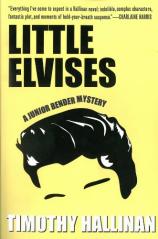Little Elvises: A Junior Bender Mystery
Review
Little Elvises: A Junior Bender Mystery
How nice it is to be favored with another Junior Bender mystery, and so quickly. It seems that I read CRASHED, the first book in the series, just a couple of months ago. I was at a low point mentally, and its combination of unique characterization and quality prose lifted me right back to where I wanted to be. Now comes LITTLE ELVISES to chase away whatever hobgoblins might be lingering in the eaves.
Timothy Hallinan has a practice of creating offbeat, immensely likable protagonists (not entirely unlike their creator) who are instantly memorable and unexpectedly competent. Junior Bender fulfills those qualifications, and in spades. He is the burglar to the stars, if your sky is filled with highly successful criminals. He follows his own code of ethics, and as was demonstrated in CRASHED, he has no qualms about throwing an ethically challenged client under the bus if the greater good can be so served. Bender is divorced (a “not want” on his part), and pines to some degree over his ex-wife and worries immensely about his teenage daughter. One of Bender’s most interesting practices, necessitated by his choice of occupations, is his penchant for never living too long in one place, thus residing at a series of hotels over the course of any given year.
"It seems that I read CRASHED, the first book in the series, just a couple of months ago. I was at a low point mentally, and its combination of unique characterization and quality prose lifted me right back to where I wanted to be. Now comes LITTLE ELVISES to chase away whatever hobgoblins might be lingering in the eaves."
LITTLE ELVISES begins with him staying at…no. Buy the book and read it. You can find out that way, and you won’t be sorry. I have to stop myself here; I'm tempted to run through the book and relate every interesting concept, metaphor and turn of phrase that Hallinan pens. Even if I did that, it would still be a great book to read. But Hallinan does not have a giant box in his office from which he pulls out such literary magic at whim. He works at it and sweats at it, and makes it look easy, but I would bet the earth and all that is on it that it isn’t easy at all.
So let’s talk about the plot, which is well worth the price of admission all by itself. LITTLE ELVISES begins with Bender being rousted by DiGaudio, a police detective who is his best frenémy and would come up short in an ethical measuring contest with him. DiGaudio has a deal for Bender: if he accepts, then DiGaudio won’t frame him for a crime that Bender never committed. The mission, should Bender choose to accept it, is to prove that a relative of DiGaudio’s was not responsible for a murder with which he has been charged. As any four-year-old knows, it’s tough to prove a negative, so Bender is going to have to find the real killer. The family member in question is Vinnie DiGaudio, a legendary (and not in a good way) music impresario who, in response to Elvis Presley’s phenomenal popularity back in the day, found and marked a bunch of similar-type singers who were known as Little Elvises. The problem for Bender is that DiGaudio looks guilty as can be of more than just murder. Matters are further complicated by the victim’s widow, who takes an untoward interest in Junior.
Meanwhile, Junior’s ex has a new love interest (not good for him), as does Junior’s daughter (even worse for him). And as if he wasn’t busy enough, the daughter of Junior’s alcoholic landlady disappears while in the company of an unsavory character. She, of course, wants him to investigate. Junior may be a burglar, but he is good at getting answers and can’t say no. Even if all of this hard work is going to come close to killing him, in the literal sense.
I would read Timothy Hallinan’s shopping list at this point, but I’m pleased to report that instead we can look forward to at least one more Bender novel (THE FAME THIEF, in July), as well as another Poke Rafferty book in the future. Our cups runneth over with enjoyment. Read LITTLE ELVISES and you’ll understand.
Reviewed by Joe Hartlaub on March 15, 2013





